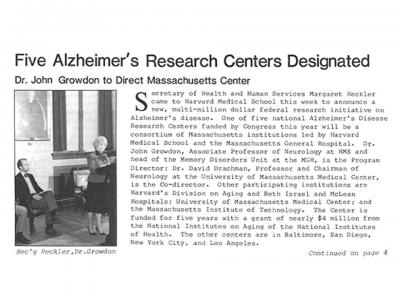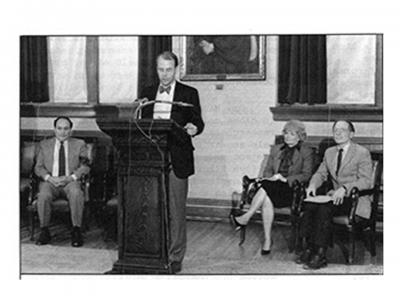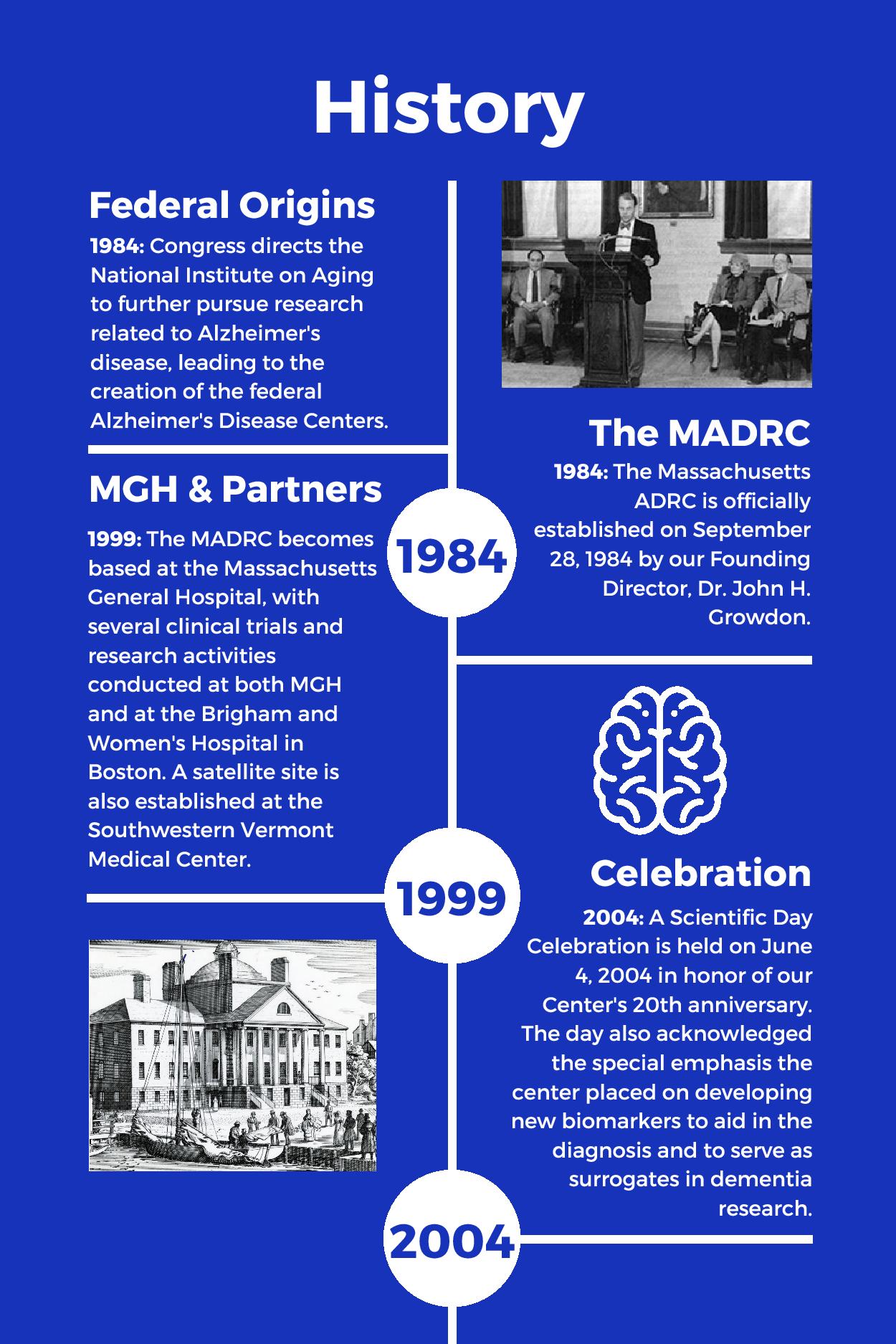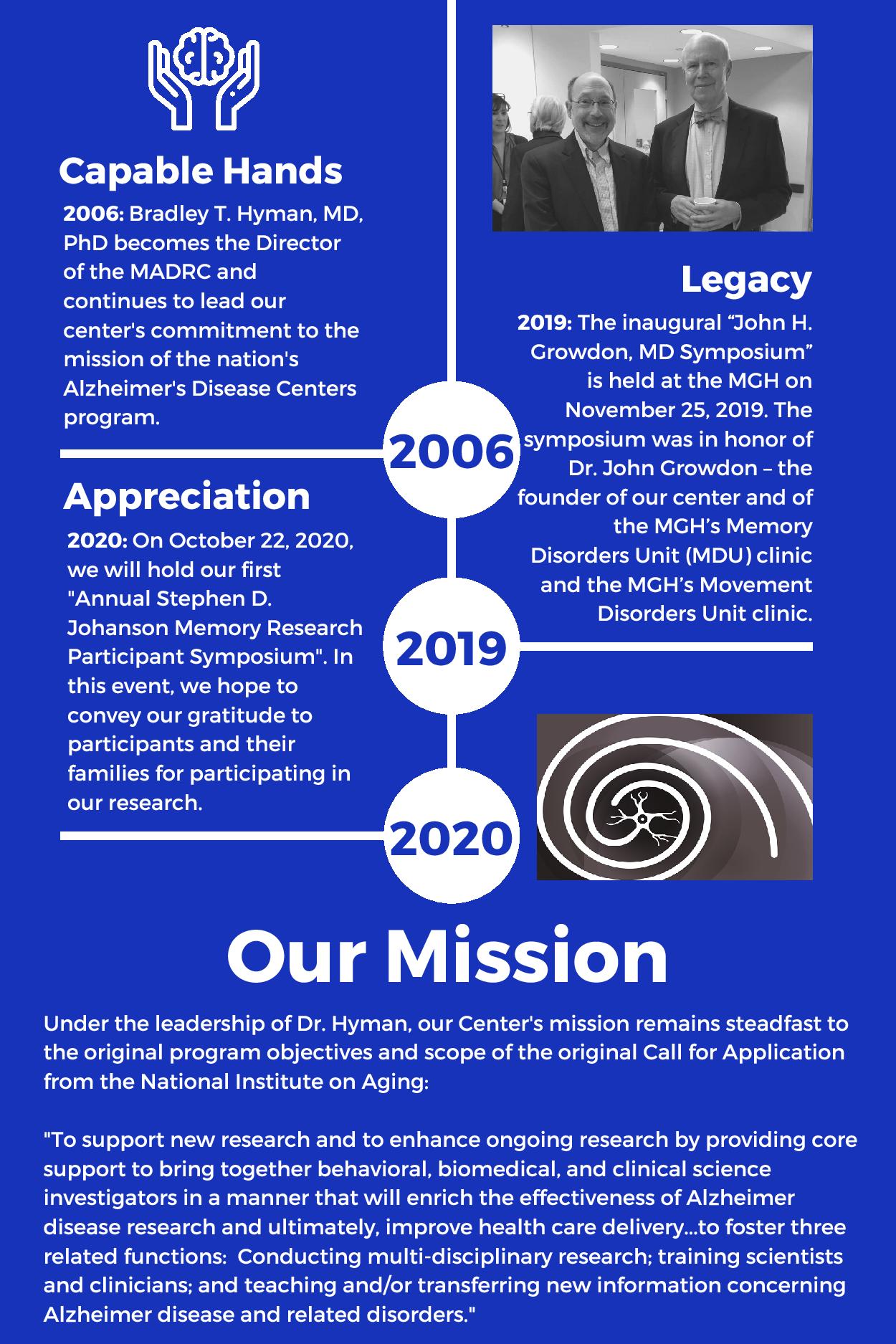History & Mission
A Brief Chronicle
The history of the federal Alzheimer’s Disease Centers (ADCs) program began in 1984, when the United States Congress directed the National Institutes of Health and in particular, the National Institute on Aging to pursue further research related to Alzheimer’s disease. The ADC program is authorized by the Public Health Service Act, Section 445 and now includes approximately thirty of such specialized research centers throughout the United States.
The original five ADCs were based at the following institutions: Harvard University, Mount Sinai Medical School, University of California at San Diego, University of Southern California, and Johns Hopkins University. For an interesting overview of the Alzheimer’s Disease Centers program’s history, please check out the attached Connections newsletter.
The Massachusetts ADRC was officially established on September 28, 1984 by our Founding Director, Dr. John H. Growdon, and it remains one of the two original ADCs (the other being the ADRC at the University of California at San Diego) that have been continually funded by the National Institute on Aging since the ADC program inception.
Our Center started as a multi-institution consortium of the Massachusetts Institute of Technology and several Harvard Medical School-affiliated institutions, including the Massachusetts General Hospital, the Brigham and Women’s Hospital, the Beth Israel Hospital (now known as the Beth Israel Deaconess Medical Center), the Harvard Division on Aging, the Hebrew Rehabilitation Center for Aged (now known as the Hebrew SeniorLife), the McLean Hospital and the University of Massachusetts Medical School at Worcester.
Dr. John Growdon served as the Director of the Center from 1984 until April 1, 2006, when he was succeeded by Bradley T. Hyman, MD, PhD. Dr. Growdon served as the Center’s Clinical Core leader from 1984 until January 2012, when he stepped down in favor of Deborah Blacker, MD, ScD, and M. Teresa Gomez-Isla, MD, PhD, as the new co-core leaders of the Clinical Core.
David A. Drachman, MD, of the University of Massachusetts Medical School at Worcester (UMass-Worcester) was the Associate Director of our Center until his retirement as Chair of the UMass-Worcester Neurology Department in 2004. E. Tessa Hedley-Whyte, MBBS, MD, founded our Center’s Neuropathology Core in 1985 and served as our Neuropathology Core leader until 2007.
John W. Rowe, MD, the founding director of the Harvard Division on Aging and the then Chief of Gerontology at the Beth Israel Hospital, established our Education and Information Transfer Core leader back in 1984. The Core was later led by Lewis A. Lipsitz, MD, from July 1 1988 until he was succeeded by Reisa A. Sperling, MD, MMSc, on April 1, 2011. Dr. Sperling in turn led the Core until April 2014, when she was succeeded by Drs. Deborah Blacker and Dorene Rentz.
Since 2014, the Education and Information Transfer Core has been renamed as the Outreach, Recruitment and Education Core. In 2016, the Core was renamed as the Outreach and Recruitment Core, with Dr. Dorene Rentz serving as Core Director, and Dr. Deborah Blacker as leader of the Core’s Research Education Component.
The Massachusetts ADRC also started with a Data Management Core in 1984, with T. John Rosen, PhD, of the Massachusetts Institute of Technology as its leader. M. Marsel Mesulam, MD, the current Director of the Northwestern University Alzheimer’s Disease Center, led our then Clinical Core site at the Beth Israel Hospital for many years. For some years, the Massachusetts ADRC also had a satellite site based at the Southwestern Vermont Medical Center in Bennington, Vermont.
Our Center has been based at the Massachusetts General Hospital since 1999, with several clinical trials and research activities conducted at both the Massachusetts General Hospital and at the Brigham and Women’s Hospital in Boston.
A Scientific Day Celebration was held on June 4, 2004 in honor of our Center’s 20th anniversary and on September 19, 2014, we celebrated our 30th anniversary with another day-long celebratory symposium — a copy of our 30th anniversary celebratory program is attached.
On April 1, 2006, Bradley T. Hyman, MD, PhD became the Director of the Massachusetts ADRC and he continues to lead our Center’s commitment to the mission of the nation’s Alzheimer’s Disease Centers program.
Our Mission
Under the leadership of Dr. Hyman, our Center’s mission remains steadfast to the original program objectives and scope of the original Call for Application from the National Institute on Aging:
“To support new research and to enhance ongoing research by providing core support to bring together behavioral, biomedical, and clinical science investigators in a manner that will enrich the effectiveness of Alzheimer disease research and ultimately, improve health care delivery…to foster three related functions: Conducting multi-disciplinary research; training scientists and clinicians; and teaching and/or transferring new information concerning Alzheimer disease and related disorders.”
Support Our Search for a Cure
The Massachusetts Alzheimer’s Disease Research Center is at the forefront of dementia research and care but our innovations in basic, translational/clinical research and commitment to bring insights from ‘bench to bedside’ also depend on the support of generous donors, patients and their families, and you.
There are a variety of ways to make a gift to our Center, including making an online gift on our secured website. Our dedicated community of scientists and clinicians are thankful for your interest in our endeavors, and we invite you to support us on the journey.




